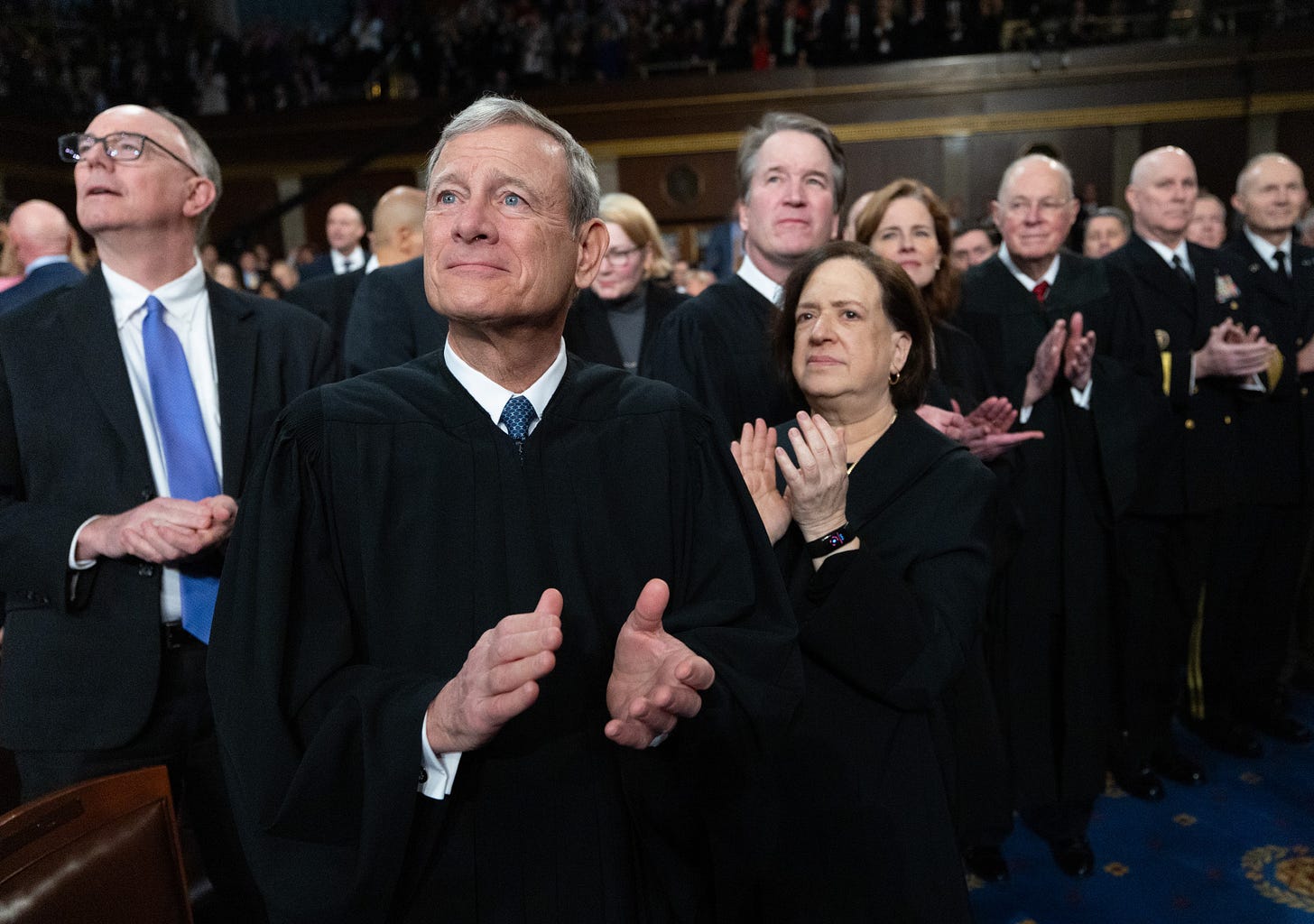The Roberts Court exists to give legal cover to bigots
The majority decision in US v. Skrmetti is the latest example.
🧠 PN is possible thanks to paid subscribers. If you appreciate our fiercely independent coverage of American politics, please support us. 👇
The best way to approach the Supreme Court’s decision in US v. Skrmetti, which upheld Tennessee’s transphobic ban on gender-affirming care for minors, is to understand that the conservative majority these days begins with their desired result and then works backward.
You’d think the conservative justices would care about how to craft their arguments, particularly Chief Justice John Roberts, a person who’s exceedingly concerned about his legacy. But they don’t. It’s not laziness — lord knows these justices probably run their Federalist Society/fascists-in-training law clerks ragged tracking down material they can bend and twist and mangle in service of rolling back civil rights. It’s that they don’t care because they don’t have to. They know they have all the power.
Think of the MAGA majority’s shoddy arguments as a flex, a reminder that five (or six) justices control your fate and can’t even be bothered to pretend that they value coherent reasoning. That’s the real legacy of the Roberts Court: a steady erosion of rights dressed up as freedom, with little care as to whether their positions are legally sound.
Roberts wrote the majority opinion in Skrmetti, a low quality mix of medical misinformation, praise for other countries that also kick trans kids in the teeth, and legal conclusions that are equal parts tortured and dishonest. None of these things is new, however. These are the usual rhetorical tricks of the Roberts Court.
Slapping a legalistic veneer on bigotry
The biggest problem for transphobes, including the conservative members of the Court, is that every major medical organization agrees that gender-affirming care for transgender minors is both safe and medically necessary.
A lengthy piece in Scientific American covers the dozens and dozens of studies showing that lack of access to gender-affirming care results in higher rates of depression, suicidal ideation, and self-harm for transgender minors. In contrast, Tennessee’s brief in Skrmetti relied in part on discredited studies.
But the Skrmetti case is the culmination of years of right-wingers ginning up a moral panic about trans youth and getting mainstream publications like The Atlantic and The New York Times to sign on. That allowed the transphobic “just asking questions” stance to be treated as if it genuinely challenged the medical consensus, which, in turn, allowed John Roberts to claim there is “ongoing debate among medical experts” about the use of hormones and puberty blockers to treat gender dysphoria.
A note from Aaron: Working with brilliant contributors like Lisa takes resources. If you aren’t already a paid subscriber, please sign up to support our work.
Roberts has a different problem here, medically speaking. He concludes that Tennessee has shown there is “an ongoing debate among medical experts regarding the risks and benefits associated with administering puberty blockers and hormones to treat gender dysphoria” and that the law “responds directly to that uncertainty.” Tennessee law states that providing puberty blockers or hormones to treat gender dysphoria “can lead to the minor becoming irreversibly sterile [and] having increased risk of disease and illness,” and it was "likely that not all harmful effects associated with these types of medical procedures when performed on a minor are yet fully known, as many of these procedures, when performed on a minor for such purposes, are experimental in nature and not supported by high quality, long-term medical studies."
So, puberty blockers and hormones are magically only dangerous when prescribed for gender dysphoria, but somehow that danger disappears when the same drugs are prescribed for something else. This is, of course, nonsense. It’s a law driven by anti-trans hatred, not medical science. The fact that Roberts quotes these things approvingly as strong evidence supporting Tennessee’s law is worse than nonsense.
Justice Clarence Thomas’s concurrence goes further, saying that no one should defer to “the authority of the expert class” because they have no right to “countermand the wisdom, fairness, or logic of legislative choices.” Yeah, we wouldn’t want sweeping restrictive laws about medical things to be based on actual science or anything like that.
In this way, Skrmetti builds on Justice Samuel Alito’s majority opinion in Dobbs v. Jackson, which stripped people of the constitutional right to abortion. Alito’s opinion eschewed a discussion of modern medicine, a necessary move because he was also stuck with the problem of consensus among medical organizations that abortion is safe and that bans interfere with the doctor-patient relationship. Instead, Alito referenced 17th- and 18th-century writings about “quickening” and manages to imply that reproductive healthcare in the mid-1800s was more scientifically grounded than current practices.
Making it up as they go
Instead of acknowledging that American medical organizations have concluded gender-affirming care for transgender minors is medically necessary, Roberts simply cherry-picks from health authorities in countries like in Finland, England, Sweden, and Norway that have expressed concern about gender-affirming care. It might not seem fair to call this a rhetorical trick unless you understand how conservative justices feel when liberal justices have referenced foreign authority as support for protecting rights rather than taking them away.
After Alito had the greatest day of his life overturning Roe v. Wade, he was so unhappy that foreign leaders criticized the decision that he had to complain about it at length in a speech at a summit on “religious liberty” sponsored by Notre Dame.
When the Supreme Court decided Lawrence v. Texas, the 2003 decision that struck down sodomy laws as unconstitutional, Justice Antonin Scalia’s dissent, which Justice Thomas joined, complained about the majority opinion’s discussion of the laws of other countries, calling it “dangerous dicta.” Dicta refers to material in a judicial opinion that is unnecessary to the holding of the case and is therefore not legally binding.
Why is it dangerous? For that, Scalia quotes Thomas’s opinion in Foster v. Florida. There, Thomas was grouchy that anyone would dare point out that other countries have abolished the death penalty: “While Congress, as a legislature, may wish to consider the actions of other nations on any issue it likes, this Court's Eighth Amendment jurisprudence should not impose foreign moods, fads, or fashions on Americans.” Got it. Super dangerous.
Of course, if it helps in the conservative project of remaking America into a conservative evangelical Christian nation, referencing other countries is just fine, which is why Roberts’s use of it here is so cynical.
Smug and sneering
Much of that conservative project is about enshrining bigotry into law. But that bigotry keeps colliding with the Equal Protection Clause of the Fourteenth Amendment and other civil rights protections. And while the Court’s conservative justices are eager to dismantle civil rights, they hate to be told they are dismantling civil rights.
In Skrmetti, the justices try to maintain plausible deniability by insisting that Tennessee’s law does not discriminate on the basis of sex even though it does so openly and obviously. Tennessee’s law prohibits the administration of puberty blockers and hormones to treat gender dysphoria, but allows that same care for minors when it is provided to facilitate “normal development” of their sex assigned at birth. So, as Justice Sonia Sotomayor explains in her dissent, if a girl is growing unwanted facial hair and it causes them distress to look masculine, a doctor can prescribe hormones, as it is not being done to treat gender dysphoria. But if the child was assigned male at birth and is distressed by looking masculine, the doctor is prohibited from prescribing hormones.
This is breathtakingly straightforward stuff — the sex of the minor determines whether they can receive certain medical care. The Tennessee law even says explicitly that it was necessary in part to “encourage minors to appreciate their sex.” But not so fast, claims the majority, because Tennessee’s law only restricts what diagnoses can be used as the basis for providing puberty blockers or hormones. So, while a transgender boy can’t get testosterone to treat gender dysphoria, he could get it, regardless of sex or transgender status, if he had another qualifying diagnosis. And since that hypothetical transgender boy could get hypothetical hormones for a hypothetical diagnosis, the law doesn’t discriminate based on sex.
The Court’s conservatives are pretty fond of this conceit. In 303 Creative v. Elenis, the majority opinion, written by Justice Neil Gorsuch, held that a Christian web designer who was opposed to same-sex marriage on religious grounds could refuse to provide design services to same-sex couples. Never mind that public accommodations laws prohibit discrimination by businesses that are open to the general public. The majority decision created a carveout where anyone who objects to same-sex marriage can refuse to work with a same-sex couple, but they had to figure out a way to say that isn’t discrimination.
Since the web designer said she would create non-wedding websites for gay or lesbian clients, the majority concluded she was not discriminating against LGBTQ people. Rather, she’s only opposed to working with same-sex couples on wedding websites. Since that hypothetical same-sex couple could ask the designer for some other type of website, one that in no way reflected they were married or getting married, it’s not discrimination. The conservative justices had already taken this argument for a spin in 2018’s Masterpiece Cakeshop v. Colorado, saying a bakery owner’s refusal to create cakes for same-sex weddings wasn’t discrimination against gays or lesbians because he would make them other types of cakes, like one for a birthday party.
As with Skrmetti, this logic is laughable. The designer said she would provide a service to a heterosexual couple that she explicitly refuses to provide to a same-sex couple. Yes, the same-sex couple could get something different, something not so marriage-y, but that’s still overt discrimination.
Roberts honed this disingenuous approach years ago. 2007’s Parents Involved in Community Schools v. Seattle School District No. 1 saw him pretending that racism in schools was over and that voluntary desegregation efforts were the real racism. Unlike many southern school districts, Seattle did not have a history of official segregation which they had been ordered to rectify, but that didn’t mean the district wasn’t segregated. Indeed, the Seattle branch of the NAACP threatened the district with a desegregation lawsuit, but the parties settled out of court in 1963. Additionally, since housing discrimination was legal in Seattle until 1968, segregated housing patterns remained in 2001 when this litigation began. That meant schools were segregated as well. But because Seattle’s segregated schools resulted from housing segregation in the city rather than an official district policy, Roberts ruled that the district’s desegregation efforts violated the Equal Protection Clause of the Fourteenth Amendment.
Yes, according to John Roberts, the amendment specifically adopted to enshrine racial equality in the Constitution must be read to mean that voluntary efforts at racial equality are unconstitutional.
Oh, and if you were wondering how Roberts squared this decision with Brown v. Board of Education, where the Court ordered schools to desegregate, his answer was that Brown only stands for the narrow proposition that children cannot be told where they can go to school based on race. This is not the way normal non-racist humans read Brown, which, for most people, stands for the broad idea that desegregation efforts are legal and necessary. For Roberts, this narrow reading of Brown tees up one of the worst lines in modern Court history: “The way to stop discrimination on the basis of race is to stop discriminating based on race.”
These arguments are smug and sneering. The Roberts Court exists to give legal cover to bigots, helping them create a world where they are insulated from any consequences. They’re also creating a world where the concept of “equality” is stripped of any historical context and limited only to whether two people have been treated exactly the same. But that’s not what equality is, and it’s not the equality contemplated by the Equal Protection Clause. Rather, that vision was about righting historical wrongs, of meaningfully addressing America’s past and building an expansive future.
There’s a quote from Anatole France that makes its way into a lot of court decisions: “The law, in its majestic equality, forbids rich and poor alike to sleep under bridges, to beg in the streets, and to steal their bread.” France’s observation was that treating everyone the same does not result in true equality, as the rich man in the quote does not need to sleep under bridges or steal bread. A prohibition on doing so affects only the impoverished person who actually does need to sleep outside.
France’s quote is meant to be sardonic, but the Court’s conservatives have adopted this stance as the noblest, truest way to interpret the law. It allows them to pretend their rulings are neutral, rather than a long-range project to undo the civil rights legislation of the 1960s and render the Equal Protection Clause useless.
Well, not entirely. They’ll happily keep twisting the purpose of civil rights legislation and the Equal Protection Clause in service of explaining how the people who really need protecting are the ones who have the most power already.
That’s it for today
We’ll be back with more tomorrow. If you appreciate today’s newsletter, please support our work by signing up. Paid subscribers make Public Notice possible.
Thanks for reading, and for your support.







Thank you for the most complete and accurate explanation I’ve read to date of the Court’s outrageous ruling on the Tennessee ban on GAC for minors and how it recapitulates the pattern of 5-6 Right Wing Justices’ contorted reasoning supporting their political stance. They are doing as much long-lasting damage to our democracy as the lunatic-in-chief.
Yes to all of this, and one more thing: Because the majority opinion held, disingenuously, that the Tennessee statute did not discriminate on the basis of transgender status, the Court did not have a reason to decide whether transgender people should be considered a suspect class, which would mean that laws that discriminate against transgender people would be subject to a higher standard of review than the very deferential “rational basis” standard. Three Republican justices, led by Justice Barrett, nevertheless went out of their way to gratuitously let us know that they don’t think discrimination against transgender people should be subject to a higher standard of review, effectively giving the OK to explicit anti-trans legislation. So to a reviled and vulnerable minority, they say suck it. You’re on your own. Don’t expect any help from the federal courts — despite the fact that four federal appeals courts with jurisdiction over 23 states currently subject laws that discriminate based on transgender status to some form of heightened scrutiny.